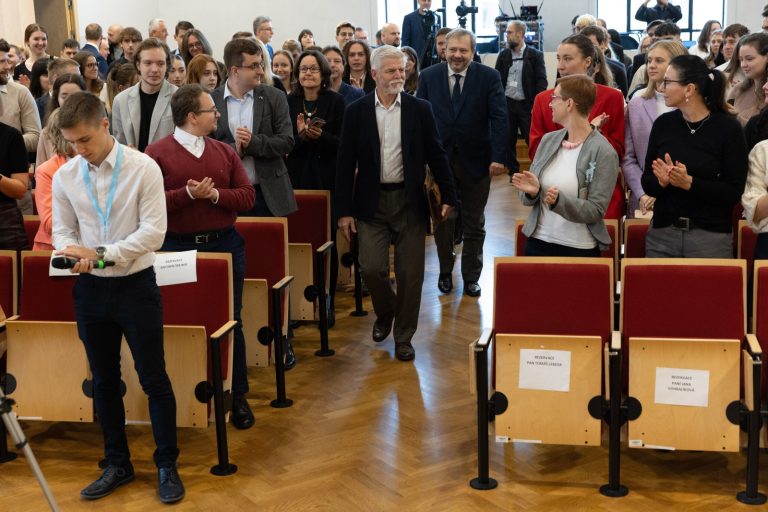President Pavel started his two-day visit at Palacky University. Credit: Zuzana Bönisch / Hrad.cz.
Olomouc, Oct 30 (CTK) – President Petr Pavel started a two-day visit to the Olomouc Region this morning, attending a debate with students at the Faculty of Arts of Palacky University.
Faculty Dean Jan Stejskal said the auditorium with about 200 seats was fully occupied within minutes of the launch of registration.
The auditorium was similarly full on 17 October last year, when the faculty joined the all-day strike.
After his visit to Olomouc, Pavel will visit the north of the region today, before returning to Olomouc on Tuesday afternoon to see the headquarters of the ground forces command.
The students discussed political topics related to the Western Balkans, China, as well as the funding of universities.
“I’m convinced that it is time for a broad debate on this topic,” the president said about university funding. “We cannot initiate work on such complex issues that meet with resistance from the system by trying to change the thinking of the members of that system, but we should work on it from the outside. Prepare experts who are not part of the ministries and state-run institutions, prepare the mechanism as it should ideally work. Parallel to this, we need to convince the critical part of the public that this is the way we want to go, and thus create pressure on the state, on politicians, who will have no choice but to follow this path in the end.”
Students also asked about Czech Defence Minister Jana Cernochova’s proposal for the Czech Republic to leave the UN because of the organisation’s recent resolution calling for an immediate humanitarian ceasefire between the radical Palestinian movement Hamas and Israel.
According to the president, there is nothing wrong with critical opinions that move society forward. “As much as we may perceive the UN as cumbersome and in specific cases paralyzed today, especially in the case of foreign political and security issues with regard to the veto power of the permanent members of the Security Council, the solution is not to withdraw from it. The solution is to look for ways to make the organisation more effective,” said Pavel.
Slovak students asked Pavel about his opinion on the direction of Slovakia after the general election in September. Pavel admitted that he was in a difficult situation where he did not want to be critical of the internal affairs of a sovereign country. However, he said he hoped that the heated rhetoric was just part of the election campaign and that cooperation between the two countries would be open and united.
“If we go our separate ways, it will definitely harm us both,” he said. “In such a complex environment, any differences between us will immediately be used against us.”
According to the dean, this is the third such high-profile visit to the faculty. The first was Empress Maria Theresa in the 18th century, and the second was President Vaclav Havel (in office 1989-2003), who received an honorary doctorate from the faculty.
Stejskal told CTK that the faculty had launched a reservation system due to the limited capacity of the auditorium, and the seats were fully booked within a few minutes.
He said the faculty was happy to be included in the program. “We see it not only as a sign of respect for Palacky University, but especially for the humanities and social sciences that we cultivate at the faculty,” he added.
President Pavel is also scheduled to visit the Olomouc Regional Office today, before moving to the north of the region. After a meeting with patriots of the Jeseniky mountain area, he will conclude today’s program in the evening with a debate with the inhabitants of Javornik in Jeseniky.
On Tuesday, Pavel will visit a company in Jesenik which produces and sells flannel shirts, have lunch with the mayors of Jesenik and Sumperk, and then tour a manually operated paper mill in Velke Losiny in the Sumperk vicinity.








